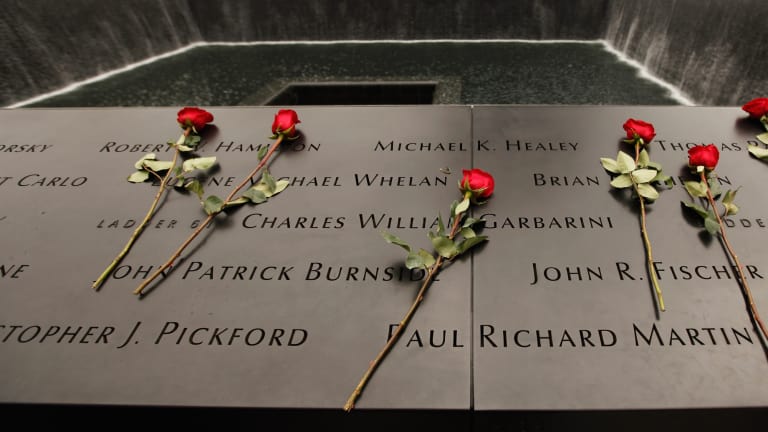While the 2018 midterm campaign season is in full swing, most candidates are taking a break today in honor of the memory of lives lost in the September 11, 2001, terrorist attacks in New York City, Washington, DC, and Shanksville, Pennsylvania. In fact, the New York Democratic primary for the Governor’s race was moved from today to Thursday to accommodate 9/11 remembrance. That move, however, still hasn’t stopped some controversy from erupting in the Empire State over campaigning on 9/11.
According to the New York Post, Democrat Cynthia Nixon, a challenger to incumbent Democratic Governor Andrew Cuomo, is taking heat for running campaign ads today:
Cynthia Nixon is running the first TV ads of her campaign for governor on Tuesday’s anniversary of the Sept. 11, 2001 terror attacks — leading critics to slam the decision as insensitive.
Nixon spokeswoman Lauren Hitt confirmed that the campaign is running “positive” 30 second spots upstate that will run in the final days leading up to Thursday’s primary election — including on Sept. 11.
“This ad presents a hopeful vision for New York’s future — in stark contrast with the appalling negative mailer that Governor Cuomo’s state party dropped on the eve of Rosh Hashanah,” Hitt said, referring to mailer that falsely tied her to anti-semitism.
But labor leaders who represent first responders and construction workers who worked at Ground Zero said running ads on 9/11 is inappropriate.
“We call upon Ms. Nixon to immediately cancel those advertisements which should not be running on a day of remembrance for our state and country,” Local 2507, the union representing FDNY’s emergency medical technicians, paramedics and inspectors said in a statement.
“The State of New York, out of respect for the sanctity of the day moved the primary election from 9/11 to 9/13. Why should any political candidate cheapen the meaning of this remembrance day by running self-serving political advertising?”
Nixon is running to the left of Andrew Cuomo, and the race has been mostly cordial between the two Democrats, but it’s clear Cuomo doesn’t want to be challenged like this. Most challengers wouldn’t have a prayer, but Nixon is a celebrity and has been able to self-finance a lot of her campaign.
Cuomo took the the shot at Nixon, saying his campaign specifically chose, “out of respect,” not to run ads on this solemn day.
This isn’t the first time that the 9/11 terror attacks have collided with campaign season, as the Post notes:
Candidates have been criticized in the past for attempting to exploit 9/11 for political gain. For example, candidates have come under fire for showing images of the World Trade Center towers collapsing in political ads.
While there are many political issues that intertwine with 9/11, including rights to privacy, foreign policy and domestic surveillance, to name a few, it’s generally best for candidates to simply stay far away from mixing their campaign pitch with the fateful day in 2001.
On a separate but related note, in light of 9/11, Politico says that Americans don’t care about terrorism anymore the way we used to:
Of all the unexpected developments of Donald Trump’s presidency, surely one of the more unlikely ones has been the slow but steady ebbing of the nation’s profound, at times almost boundless, fixation on the threat of terrorism.
The development is unexpected because over the 17 years since the attacks of September 11, 2001, jihadist extremism has come to dominate America’s threat landscape like nothing else since Soviet Russia did during the Cold War. What’s more, as poll after poll has shown, terrorism has been far and away the only foreign policy issue Americans care deeply about and the prism through which their sense of national security is defined.
…
While some might claim the decline in coverage reflects a decline in terrorist activity, that argument is weak: The New York City rental truck attack on October 31, 2017, that killed eight caused more fatalities than all but three incidents in the U.S. since 9/11. The attack received a fraction of the attention of earlier terrorist events.
Polling gives only limited help in determining public concern today about terrorism: Most surveys on the subject are conducted right after attacks. Interestingly, there wasn’t one after the New York City incident, and there haven’t been many others of late. Gallup found in March that 40 percent of those asked were very concerned about future terrorist attacks in the U.S., a notable decline from 48 percent in 2016. (For comparison: The number in 2002, just months after 9/11 was 49 percent.)
Trump himself appears to have forgotten about the subject. Talk of terrorism has virtually disappeared from his shambolic rally performances.
As Politico points out, it’s not that terrorism has gone away, but it has morphed from large scale 9/11-style attacks, carried out by Islamic extremists like Osama bin Laden, to small-scale attacks, such as mowing down civilians with trucks, or a lone gunman, motivated by ISIS, shooting up a night club. Americans don’t seem to fear another 9/11, and they seem to be “living with” the danger of smaller, more isolated attacks which has pushed terrorism fears down the list of voter concerns.
Here’s a look back on that day 17 years ago, courtesy of CNN, lest the civilized world forget:
Donate Now to Support Election Central
- Help defend independent journalism
- Directly support this website and our efforts
